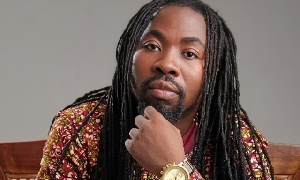- Home - Entertainment
- Lifestyle News
- Year In Review
- Music News
- Entertainers
- Entertainment Archive
- Entertainment Photos
- Jokes
- Entertainment Headlines
- Ameyaw Debrah
- Brown GH
- Celebrities Buzz
- GH Base
- Ghana Celebrities
- Gh Gossip
- GH Page
- GH Splash
- Hot Gossip GH
- YEN
Entertainment of Tuesday, 3 June 2025
Source: www.ghanawebbers.com
The Spirit of Hiplife lives as Ghana’s beat of identity and influence
How Ghana’s New Generation Artists Are Powering a Transformative Genre
The early 1990s were a turning point for Ghana. Democracy returned, and youth culture began to change. The music scene shifted as Highlife lost its appeal among younger audiences. They sought a sound that reflected their reality.
Reggie Rockstone answered this call. He combined Highlife's soul with American Hip-Hop's rhythm. This fusion created Hiplife, which featured lyrics in Twi and Pidgin English. Hiplife quickly became relatable and accessible.
In those early years, if the streets of Ghana could sing, they would rap over Hiplife beats. “Ei Charlie, drop that beat” echoed across schoolyards and street corners. This phrase marked the start of a cultural movement.
A Genre in Motion
Today, Hiplife is thriving globally. Spotify streams have increased by 79% in three years. This growth averages 34% annually.
In Ghana, the increase is even more impressive. Since 2022, Hiplife streams have jumped by 203%. In 2024 alone, there was a remarkable 90% rise.
Among listeners in Ghana, 44% are aged 18-24. Another 29% fall within the 25-29 age group. Globally, similar trends exist: 38% of streams come from ages 18-24.
KiDi Music states that Hiplife is essential to today’s sound. He believes it has evolved but remains foundational for many artists today.
Who’s Leading the Charge?
Pioneers like Reggie Rockstone laid the groundwork for Hiplife. Now, new artists are taking it to global charts. Black Sherif leads this new generation with his storytelling style.
He is joined by King Promise, KiDi, Sarkodie, and Gyakie. Other popular artists include Kwesi Arthur and Kofi Kinaata on Spotify's streaming lists.
Classic tracks still resonate today too. Songs like Reggie Rockstone’s "Ah!" continue to gain streams.
KiDi acknowledges past artists who shaped Ghanaian music: “We just renovated it.”
The Sound of Reinvention
Hiplife continues to evolve creatively. Joey B mixes it with drill music in songs like "Princess." Asakaa artists blend Twi lyrics with global drill rhythms.
Efya believes innovation is crucial for Hiplife's future: “Fusion is key.” She sees Asakaa and Afrobeats as extensions of original Hiplife energy.
She emphasizes emotion and storytelling in current music trends: “Artists express themselves bolder now.”
At the recent Ghana Music Awards, Tulenkey's "Bad Feeling" won Song of the Year while Kweku Smoke took Best Artist honors.
A Diaspora Rewind
Hiplife now reaches beyond Ghana’s borders too. The top five countries streaming it are Nigeria, USA, UK, Germany, and Netherlands.
UK-based artist Bree Runway reintroduces classic Hiplife through viral remixes of old hits. Her work appeals to both older fans and Gen Z listeners discovering these tracks anew.
Ghanaian-Dutch artist Frenna also samples classic sounds in his recent work with Shallipopi.
Where Next? The Road Ahead for Hiplife
Listening to "The Game" by Obour reflects both challenges and hopes for Hiplife's evolution after thirty years. The genre isn’t fading; it's evolving instead.
Efya believes future developments must be intentional: “We need to preserve essence while pushing boundaries.” Collaborations across generations can create magic through diverse sounds.
If recent trends continue, Hiplife shows no signs of slowing down. Its future will be shaped by bold voices from Ghana’s youth.











